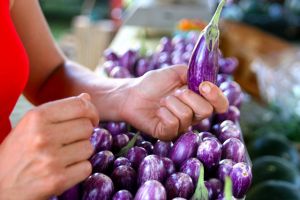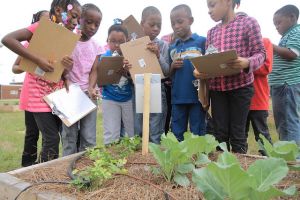
Baking in Cast Iron Skillet. Photo by Chiot’s Run. http://tinyurl.com/pmvnokp
Share This
Print This
Email This
“State of the Plate”: An Update on Food Studies at UNC Chapel Hill
Witnessing the exponential growth of food studies is both exciting and overwhelming! Since I began teaching my first course on American food cultures, “Cooking Up a Storm” at the University of North Carolina at Chapel Hill in 2005, students have clamored for more food-related classes, asked us to create a certificate in food studies, lobbied UNC administration and food services for more locally sourced food on campus, brought a farmer’s market to the green grass of Polk Place each semester, and traveled throughout North Carolina and around the world engaged in vital food-related study. New York Times journalist Kim Severson observed this on a national level in 2009, reporting that the number of college graduates committed to social change who were participating in farming apprenticeships had reached an all-time high: “They come armed with little more than soft hands and dog-eared copies of Michael Pollan’s The Omnivore’s Dilemma.”1 Today, our food studies students have all read Pollan and are entrepreneurial pioneers in food-related nonprofits and groundbreaking start-up initiatives. This article tells a little about how we got here and the exciting places we’re headed.
The University of North Carolina at Chapel Hill Food Studies Consortium is a dynamic, multidisciplinary team of faculty and students committed to research, teaching, scholarship, collaboration, and community engagement in the field of food studies. We apply strengths in American studies, African American studies, Southern studies, folklore, anthropology, archaeology, art, communication studies, documentary studies, environmental studies, geography, global studies, history, literature, philosophy, political science, public health, public policy, sociology, theology, and women’s studies as we discuss food and culture, agriculture, the environment, nutrition, justice, and access to food. Given the interdisciplinary nature of UNC’s American Studies Department and its signature strengths in Southern studies and folklore, UNC is uniquely positioned to expand food studies throughout the university and the region. Plans are under way to develop a food studies certificate program within American Studies. Much appreciation is owed to Dean Karen Gil (UNC College of Arts and Sciences), Senior Associate Dean Terry Rhodes, and Dean Barbara Rimer (Public Health) for their strong support of food studies at UNC.
Many graduate students in the American Studies Master’s Program in Folklore have chosen food studies for their thesis projects, examining topics such as social history/folk narratives of the Carrboro Farmers Market, contemporary Southern homesteading movements, pastured-raised pork farms, Laotian food/identity in western North Carolina, pimiento cheese as a food of labor and leisure, and the intersection of food, gender, and ethnicity in the food marketplace of Chapel Hill.

Fairy tale eggplants from Elysian Fields Farm at the Carrboro Farmer’s Market. Photo by thatsavagegirl. http://tinyurl.com/m9tu286
UNC’s Global Research Institute’s Program in Food, Agriculture and Sustainable Development (best known for EATS 101 and the Global American South Conference) is an invaluable partner in UNC food studies. In 2010, Inger Brodey (Comparative Literature) and Marcie Cohen Ferris (American Studies) organized a “Food and Culture Cluster,” a pathway of UNC food studies courses. The vibrant student activism of FLO (Fair, Local, Organic) Food, a UNC campus organization, supported food studies, as did the founding of Triangle University Food Studies (TUFS, 2010), a group of faculty and students from Duke, UNC, and NCSU, initially funded by Duke’s John Hope Franklin Institute and UNC’s Institute for the Arts and Humanities.
TUFS highlights regional food studies through academic research, scholarly writing, collaboration, and community work. In February 2012, TUFS organized its first conference, “Shared Tables: A Triangle Symposium on Local and Global Food Studies,” cosponsored by Duke and UNC. The symposium attracted more than five hundred people. Attendees and speakers included regional faculty, scholars from across the country, university students (graduate and undergraduate), high school students, and community activists and organizers. The program featured a keynote address by Will Allen, MacArthur fellow and inspirational voice for the sustainable urban farming movement in the United States.
In 2008 Alice Ammerman (Public Health), director of UNC’s Center for Health Promotion and Disease Prevention, was funded by a Gillings Innovation grant to explore the link between sustainable local food systems and public health, including the impact on obesity, the environment, and economic viability. Ammerman and Molly DeMarco, along with a team of faculty and student collaborators, continue to expand this research, which builds on the strengths of North Carolina and southeastern food systems (diverse agricultural base, gardening, communal food traditions) while addressing significant health, economic, and environmental challenges associated with transitioning to a more industrialized food production and distribution system (learn more at http://hpdp.unc.edu/research/sustainable-agriculture/projects/).
Public health research initiatives at UNC have examined the impact of school and community gardens on children’s taste preferences and vegetable consumption, strategies to increase healthy food access through corner stores, the use of SNAP (formerly food stamps) and market match programs in farmers’ markets, cost-offset mobile markets to reach low-income consumers, cooking classes and demonstrations for seasonal foods, and integrating local food in a family-owned supermarket chain. One project updated classic Southern recipes to improve their nutritional values, and the healthy hushpuppy recipe won second place in the “Southern sides” contest of the Kinston-Lenoir County BBQ Festival. DeMarco and Ammerman teach an undergraduate service-learning course—NUTR 245: Sustainable Local Foods and Public Health—and guest lecture in many other courses on campus. Ammerman also teaches a public health entrepreneurship course that has spawned a number of social ventures related to local food systems and healthy food access. One of these is “Seal the Seasons,” a student project that prepares and flash freezes produce that is then sold at affordable prices to schools and low-income community members.
Marcie Cohen Ferris and Sharon Holland will teach “Carolina Cooks, Carolina Eats,” an interdisciplinary course developed for spring 2015 with Ammerman and DeMarco. Funding to develop the course came from the Southern Studies Fund in the Department of American Studies and the UNC College of Arts and Sciences 2014 Interdisciplinary Initiative. Bernie Herman, George B. Tindall Distinguished Professor of American Studies and Folklore and an important voice in Southern food studies, will serve as an advisor for the course and a guest lecturer during the semester. Elizabeth Engelhardt, American Studies’ newly hired John Shelton Reed Distinguished Professor in Southern Studies and a leading scholar in Southern food studies, will also participate as a guest lecturer in the course.
“Carolina Cooks, Carolina Eats” explores the history and the contemporary state of the plate in the five major regions of North Carolina: the Coast, Eastern Carolina, the Piedmont, Western Carolina, and the Borderlands. Students will produce videotaped oral history interviews that document North Carolina’s rich ties to cooking and eating as a link to national and global food issues. In collaboration with the Southern Foodways Alliance and UNC’s Southern Oral History Project, students will shape these materials into a digital documentary film project for the course. The community-based ethnography and oral histories will be archived in Wilson Library’s Southern Folklife Collection at UNC, which is dedicated to collecting, preserving and disseminating vernacular music, art, and culture related to the American South. The Department of American Studies Digital Innovation Lab will support integration of digital technologies into the course.
“Carolina Cooks, Carolina Eats” dovetails with UNC’s Global American South Conference, “The State of the Plate: Food and the Local-Global Nexus,” March 27–28, 2015, which will examine Southern food cultures and the impact of global food issues and challenges on regional food systems. Food has also been proposed as the university-wide teaching and research theme at UNC, following the current pan-campus theme of “Water in Our World.” UNC’s Global Research Institute recently announced that its next research theme will be “Feeding a Hungry World: Food Security in the 21st Century.”
To support and encourage regional food scholarship, a special food issue of UNC’s Center for the Study of the American South’s journal, Southern Cultures, will be published in spring 2015—the third in a widely acclaimed and continuing series (see Southern Cultures vol. 15, 2009, and vol. 18, 2012).
The field of food studies at UNC dovetails with initiatives in the Nicolas School of the Environment at Duke and at North Carolina State University, both of which focus on sustainable food systems, as well as food studies courses in Duke’s Center for Documentary Studies.
When we recite Brillat-Savarin’s maxim, “Tell me what you eat, and I will tell you what you are,” we seldom apply that truth to the humanities and the world of ideas.2 Through scholarship, teaching, and service that emanate from food cultures, the field of food studies broadens humanities’ inquiry and builds on an impressive number of student- and faculty-led food, agriculture, and society initiatives under way at UNC. As we move forward, food studies at UNC enables students and faculty in cultivating a dynamic, integrated curriculum that reaches beyond disciplinary and institutional lines and into our communities and region. Food studies at Carolina challenges and inspires documentation, research, innovation, and social engagement.
1. Kim Severson, “Many Summer Internships Are Going Organic,” New York Times, May 24, 2009.
2. Jean Anthelme Brillat-Savarin, The Physiology of Taste, 1825.








What an exciting new development in higher education. Thanks to you and your colleagues for pioneering in the developments — so needed in today’s America